
Nuclear disarmament is the act of reducing or eliminating nuclear weapons. Its end state can also be a nuclear-weapons-free world, in which nuclear weapons are completely eliminated. The term denuclearization is also used to describe the process leading to complete nuclear disarmament.

World War III, also known as the Third World War, is a hypothetical future global conflict subsequent to World War I (1914–1918) and World War II (1939–1945). It is widely assumed that such a war would involve all of the great powers, like its predecessors, as well as the use of nuclear weapons or other weapons of mass destruction, surpassing all prior conflicts in geographic scope, devastation and loss of life.

The World Peace Council (WPC) is an international organization created in 1949 by the Cominform and propped up by the Soviet Union. Throughout the Cold War, WPC engaged in propaganda efforts on behalf of the Soviet Union, whereby it criticized the United States and its allies while defending the Soviet Union's involvement in numerous conflicts.
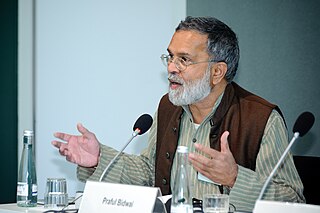
Praful Bidwai was an Indian journalist, political analyst, and activist. He was known for his left-leaning analysis of India's politics and economics. In Bidwai's memory, his friends, including the Transnational Institute, created the Praful Bidwai Memorial Award intended to honor and highlight courageous and independent voices in journalism.
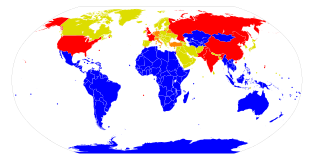
Nuclear sharing is a concept in NATO's policy of nuclear deterrence, which allows member countries without nuclear weapons of their own to participate in the planning for the use of nuclear weapons by NATO. In particular, it provides for involvement of the armed forces of those countries in delivering nuclear weapons in the event of their use.

The International Peace Bureau, founded in 1891, is one of the world's oldest international peace federations. The organisation was awarded the Nobel Peace Prize in 1910 for acting "as a link between the peace societies of the various countries". In 1913, Henri La Fontaine was also awarded the Prize "[For his work as] head of the International Peace Bureau". As of 2012, eleven other Nobel Peace Prize laureates have been members of the IPB.
The International Network of Engineers and Scientists for global responsibility (INES) is an independent non-profit-organization concerned about the impact of science and technology on society.
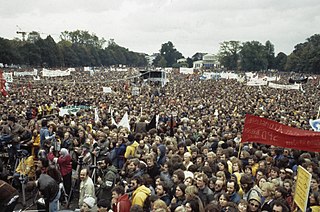
The NATO Double-Track Decision was the decision by NATO from December 12, 1979, to offer the Soviet Union and Warsaw Pact a mutual limitation of medium-range ballistic missiles and intermediate-range ballistic missiles amidst the Soviet invasion of Afghanistan. In case of refusal, NATO planned to deploy more medium-range nuclear weapons in Western Europe after the Euromissile Crisis.
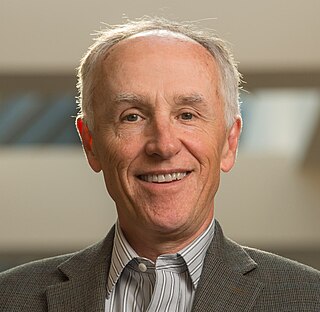
David Cortright is an American scholar and peace activist. He is a Vietnam veteran who is currently Professor Emeritus and special adviser for policy studies at the Keough School of Global Affairs and Kroc Institute for International Peace Studies at the University of Notre Dame, and the author, co-author, editor or co-editor of 22 books. Cortright has a long history of public advocacy for disarmament and the prevention of war.

A peace movement is a social movement which seeks to achieve ideals such as the ending of a particular war or minimizing inter-human violence in a particular place or situation. They are often linked to the goal of achieving world peace. Some of the methods used to achieve these goals include advocacy of pacifism, nonviolent resistance, diplomacy, boycotts, peace camps, ethical consumerism, supporting anti-war political candidates, supporting legislation to remove profits from government contracts to the military–industrial complex, banning guns, creating tools for open government and transparency, direct democracy, supporting whistleblowers who expose war crimes or conspiracies to create wars, demonstrations, and political lobbying. The political cooperative is an example of an organization which seeks to merge all peace-movement and green organizations; they may have diverse goals, but have the common ideal of peace and humane sustainability. A concern of some peace activists is the challenge of attaining peace when those against peace often use violence as their means of communication and empowerment.
During the Cold War (1947–1991), when the Soviet Union and the United States were engaged in an arms race, the Soviet Union promoted its foreign policy through the World Peace Council and other front organizations. Some writers have claimed that it also influenced non-aligned peace groups in the West.

Büchel Air Base is a military air base of the Luftwaffe in Büchel (Germany), near the city of Cochem and at about 70 km from Spangdahlem Air Base. It is home to the Taktisches Luftwaffengeschwader 33 of the German Air Force (Luftwaffe) and the 702 Munitions Support Squadron (702 MUNSS) of the United States Air Force (USAF). Since 1985, tactical Air Force Wing 33 has been operating German Panavia Tornado airplanes, which can deliver twenty B61 nuclear bombs, the only remaining nuclear weapons in Germany. As of 2023, Büchel was one of six active air bases in five European countries with B61 nuclear bombs in underground WS3 Weapon Storage and Security System inside aircraft shelters, per nuclear sharing. Since 1996 there have been annual protests and over one hundred activists have been sentenced for nonviolent protest.

An anti-war movement is a social movement, usually in opposition to a particular nation's decision to start or carry on an armed conflict. The term anti-war can also refer to pacifism, which is the opposition to all use of military force during conflicts, or to anti-war books, paintings, and other works of art. Some activists distinguish between anti-war movements and peace movements. Anti-war activists work through protest and other grassroots means to attempt to pressure a government to put an end to a particular war or conflict or to prevent one from arising.

The Campaign for Nuclear Disarmament (CND) is an organisation that advocates unilateral nuclear disarmament by the United Kingdom, international nuclear disarmament and tighter international arms regulation through agreements such as the Nuclear Non-Proliferation Treaty. It opposes military action that may result in the use of nuclear, chemical or biological weapons, and the building of nuclear power stations in the UK.

The Treaty on the Prohibition of Nuclear Weapons (TPNW), or the Nuclear Weapon Ban Treaty, is the first legally binding international agreement to comprehensively prohibit nuclear weapons with the ultimate goal being their total elimination. It was adopted on 7 July 2017, opened for signature on 20 September 2017, and entered into force on 22 January 2021.

The 2017 Nobel Peace Prize was awarded to the International Campaign to Abolish Nuclear Weapons (ICAN) "for its work to draw attention to the catastrophic humanitarian consequences of any use of nuclear weapons and for its ground-breaking efforts to achieve a treaty-based prohibition on such weapons," according to the Norwegian Nobel Committee announcement on October 6, 2017. The award announcement acknowledged the fact that "the world's nine nuclear-armed powers and their allies" neither signed nor supported the treaty-based prohibition known as the Treaty on the Prohibition of Nuclear Weapons or nuclear ban treaty, yet in an interview Committee Chair Berit Reiss-Andersen told reporters that the award was intended to give "encouragement to all players in the field" to disarm. The award was hailed by civil society as well as governmental and intergovernmental representatives who support the nuclear ban treaty, but drew criticism from those opposed. At the Nobel Peace Prize award ceremony held in Oslo City Hall on December 10, 2017, Setsuko Thurlow, an 85-year-old woman who survived the 1945 atomic bombing of Hiroshima, and ICAN Executive Director Beatrice Fihn jointly received a medal and diploma of the award on behalf of ICAN and delivered the Nobel lecture.

Beatrice Fihn is a Swedish lawyer. She was the executive director of the International Campaign to Abolish Nuclear Weapons (ICAN) from 2014 to 1 February 2023.
Joseph Gerson is an American peace and disarmament activist. He is president of the Campaign for Peace, Disarmament and Common Security and vice-president of the International Peace Bureau. Since 1976 he has served the American Friends Service Committee as director of the Peace and Economic Security Program.
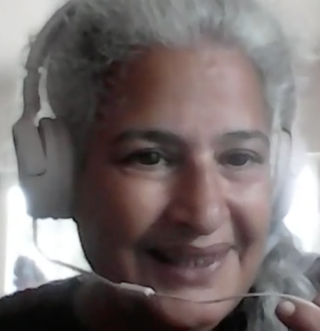
Sharon Dolev is an Israeli peace and human rights activist focusing on eliminating weapons of mass destruction from the Middle East. She does this through innovations in education, advocacy and activism to change public policies. She is the founder and director of the Israeli Disarmament Movement (IDM) and a co-founder and executive director of the Middle East Treaty Organization (METO). She also worked for a time with the International Campaign to Abolish Nuclear Weapons (ICAN), which won the Nobel Peace Prize in 2017.
Susan Crane is a peace activist, a member of the California Catholic Worker movement and a participant in the Plowshares movement. After decades of civil disobedience related to campaigns against nuclear war, she was sentenced to jail time in Germany in 2024.















